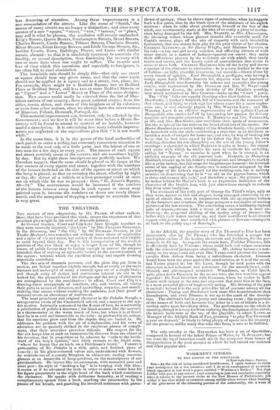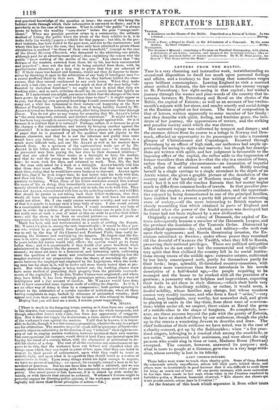WORKMEN'S STRIKES.
TO THE EDITOR OF THE SPECTATOR.
13 Ranclaxh Grove, Pimlico.
Sta—At the risk of being considered troublesome, I again venture to Claim your indulgence for a few minutes ; and I do so in consequence of an article which apeeared in last week's paper, entitled " Workmen's Strikes." Not that I differ with you to any extent: your reasoning is just and conclusive, especially when it relates to the present strike at the New llouses of Parliament; yet withal it has that defect so common among middle-class writers when treating of the grievances of the labouring portion of the community, via, a want of
ir.al practical knowledge of the question at issue ; the cause of this being the iedirect mode through which their information is conveyed to them ; and it is peculiarly so in the case of the MISODS. What is called "the public " is always prone to believe the wealthy "corn-dader " before the poor " orange-mer- chant" When any peculiar question arises in a community, the ordinary Method of letting the public know the whole of the facts relative to it, is to inake daily (or weekly) papers a vehicle for that purpose : but this, in the re- lent instance, has been denied to the poor men, and not to the contractors; and "there this has not been the case, they have only been admitted to prints whose circulation is confined " to those of their own household," (except in the case of the liberal Morning Chronicle, who demurred to the admitting one article, although paid for at advertisement prices); thus explaining the reason why the public "know nothing of the merits of the case." You observe that "the defence of the masters, extorted from them hit by bit, has been unconnected and imperfect": does not the fact of its being extorted from them, with its pusillanimous character, go a long way to prove that they are ashamed of ft ? If their cause was honest and humane, would not they do honour to them- selves by throwing it open to the arbitration of any body of intelligent men ?— a course proffered them by their men. But no, they harbour behind the class- excuse, that they cannot condescend to any such terms. When they make ant such a bad case, we need not wonder much at that of the men being "ob- fuscated by rhetorical flourishes": we ought to bear in mind that they are working men; and as such, criticism should lay its ascetic hand but lightly on them. if I understand you aright, you seem to think that the charges of the men have grown by degrees, "as if added to from time to time" : it might appear so toyou; but from my own personal knowledge I could enumerate three times as many not a whit less tyrannical in their nature—all happening at the New Houses of Parliament Indeed, Sir, the fear of being harshly treated by Mr. ALLEN deterred me from returning to work, after being absent some time through glness. You do not give us any reason for assuming that Mr. ALLEN'S letter
b "the most temperate, rational, and distinct statement." It might well be : be has been long enough in answering the charges brought against him. Or is it because it is distinct that it is rational? Perhaps, rather, it is because he gives the charges a flat contradiction and retorts by bringing another against the Unionists? It is the easiest thing imaginable for a person to write on a sheet of paper that he is possessed of all the qualities that add dignity to the human character, and that he is not the inhuman and guilty man some would have you believe ; but to prove that he is such as he asserts, is a much more difficult task, and one Mr. ALLEN as well as his masters have shrunk from. As a specimen of the equivocations made use of by Mr. ALLEN in his letter, allow me to notice one special case "he denies that he prevented men from paying the last rites to their deceased relatives;" and that one asked for three weeks or a fortnight to bury hi mother, and that he told the young man that he could not keep his job open for him.: he went, took ten days, and returned to work. Now, Sir, the fact is, the man only asked for a week or a fortnight. ALLEN harshly told him that three days must suffice. The man told him that that was not suffi- cient time, seeing that he would have some business to transact. ALLEN again told him, that if he took longer time, he had better take his tools with him, and then left him. The young man then proceeded to gather up his tools pre- paratory to leaving. When those of his fellow-workmen around him learned the cause of his so doing, they immediately convened a meeting, and unani- mously advised the young man to go, and not to take his tools with him. They then saw ALLEN, remonstrated with him on his unfeeling conduct ; and told him that should he persist in not taking back their fellow-workman, that they would all leave the employment—an alternative he well knew his masters would not allow. Sir, I can easily excuse necessary severity, and not a little of that is requisite to manage such a large body of men. I also would submit to a considerable deal of ill-humour, before I would recommend any body of men to strike for a redress of grievances, for in either case to gain is to lose : but really men of such a cast of mind as this are unfit to govern their fellow men; and the above is far from an overlaid picture—a series of years of oppression akin to this has brought about the present strike. Much has been said and recommended as a mode of settling the dispute. Mr. Waxrry's plan is, among the rest, impracticable: it would be like a per- son who wished to go speedily from London to Leith, taking a vessel which was to Bail by the way of the Channel and Pentland Firth, thus vastly in- creasing the distance and multiplying the dangers. He forgets that the dis- ease is in active operation, and the speedier the remedy the better. It would be years before his tonics would take effect; the system would go to decay before then ; and it is questionable if they would ever prove beneficial when administered in disputes like the present. If so, our intelligence must be in- creased; we must act more in a benevolent and forbearing spirit, cultivating more the qualities of our moral and intellectual nature—indulging less the rougher material of our propensities : then the theory of amending the griev- ances between the employer and employed by the Legislature, when the work- log man has his share in it, will be better and more timely tested than at pre- sent. But while this change is being worked out, the working classes must have some method of protecting their property from the probable encroach- ments of the capitalists. To do this, Trades Unions were originated; and where they have failed, it has been through premature action, caused by a want of intelligence and a due amount of caution. Mr. WAKLEY would have done well to have counselled some vigorous mode of settling the dispute. As it is, I see no other way of doing it than by a compromise; both parties agreeing to Submit to the arbitration of a certain number of individuate, when all those baring complaints to urge, backed by witnesses of undoubted veracity, shall appear and state their cases; and that the decision of this tribunal be binding.
• Hoping that you will find me a nook, I remain yours respectfully, Mrnrs.
[There is much in the foregoing letter, coming as it does from one engaged in the dispute, that commands approvaL It is upon the whole temperate, and though somewhat loaded with words, free from any appearance of exaggera- tion. But it does not supply the desideratum' a clear, matter-of-fact statement of the workmen's case against the masters. Until that be known, it is impos- Ale to decide, though it is a fair, seeming proposition, whether the case is a proper one for arbitration. The masters may—we speak still in ignorance offsets—rea- sonably object to submitting to the decision of any "tribunal" their right to em- ploy or not to employ certain workmen, however irrational their own reasons. Our correspondent, for instance, would think it hard if any one insisted upon his buying his bread.of a certain baker, with the alternative of arbitration to de- cide his choice of a shop. The root of all the confusion and embarrassment ap- pears to be this, that the workmen have not defined and classified what are things upon which they can insist in point of law, upon what they eon insist in respect to their power of enforcement, upon what they ought to insist as morally right, and upon what it is expedient they should insist as a matter of convenience in trade. Upon many things which are right enough to require, we have no power of insisting : we cannot, for example, compel a man to be be- nevolent or generous. But we can force him to fulfil a contract, and we can usually shame him into complying with the commonly recognized rules of pro- priety. Our moral power is lost, however, if it is mixed up with undue de- mands, or with threats that cannot be enforced- Workmen's Unions might be powerful, organs for directing public opinion, if the workmen more sternly and logically laid down theiebroad principles of action.—En.]



























 Previous page
Previous page